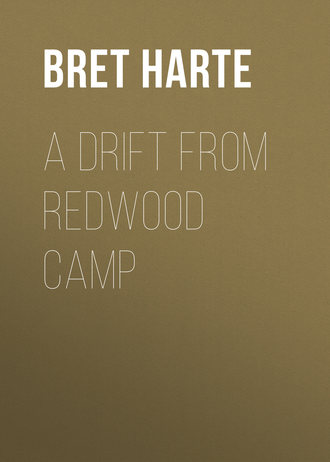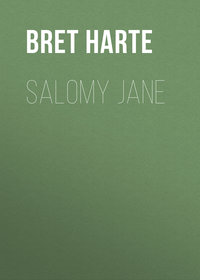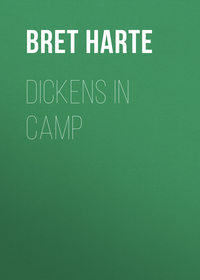
A Drift from Redwood Camp
He had sat thus a hundred times, as aimlessly blinking at the vast possibilities of the shining sea beyond, turning his back upon the nearer and more practicable mountains, lulled by the far-off beating of monotonous rollers, the lonely cry of the curlew and plover, the drowsy changes of alternate breaths of cool, fragrant reeds and warm, spicy sands that blew across his eyelids, and succumbed to sleep, as he had done a hundred times before. The narrow strips of colored cloth, insignia of his dignity, flapped lazily from his tent-poles, and at last seemed to slumber with him; the shadows of the leaf-tracery thrown by the bay-tree, on the ground at his feet, scarcely changed its pattern. Nothing moved but the round, restless, berry-like eyes of Wachita, his child-wife, the former heroine of the incident with the captive packers, who sat near her lord, armed with a willow wand, watchful of intruding wasps, sand-flies, and even the more ostentatious advances of a rotund and clerical-looking humble-bee, with his monotonous homily. Content, dumb, submissive, vacant, at such times, Wachita, debarred her husband’s confidences through the native customs and his own indifferent taciturnity, satisfied herself by gazing at him with the wondering but ineffectual sympathy of a faithful dog. Unfortunately for Elijah her purely mechanical ministration could not prevent a more dangerous intrusion upon his security.
He awoke with a light start, and eyes that gradually fixed upon the woman a look of returning consciousness. Wachita pointed timidly to the village below.
“The Messenger of the Great White Father has come to-day, with his wagons and horses; he would see the chief of the Minyos, but I would not disturb my lord.”
Elijah’s brow contracted. Relieved of its characteristic metaphor, he knew that this meant that the new Indian agent had made his usual official visit, and had exhibited the usual anxiety to see the famous chieftain.
“Good!” he said. “White Rabbit [his lieutenant] will see the Messenger and exchange gifts. It is enough.”
“The white messenger has brought his wangee [white] woman with him. They would look upon the face of him who hides it,” continued Wachita, dubiously. “They would that Wachita should bring them nearer to where my lord is, that they might see him when he knew it not.”
Elijah glanced moodily at his wife, with the half suspicion with which he still regarded her alien character. “Then let Wachita go back to the squaws and old women, and let her hide herself with them until the wangee strangers are gone,” he said curtly. “I have spoken. Go!”
Accustomed to these abrupt dismissals, which did not necessarily indicate displeasure, Wachita disappeared without a word. Elijah, who had risen, remained for a few moments leaning against the tent-poles, gazing abstractedly toward the sea. The bees droned uninterruptedly in his ears, the far-off roll of the breakers came to him distinctly; but suddenly, with greater distinctness, came the murmur of a woman’s voice.
“He don’t look savage a bit! Why, he’s real handsome.”
“Hush! you—” said a second voice, in a frightened whisper.
“But if he DID hear he couldn’t understand,” returned the first voice. A suppressed giggle followed.
Luckily, Elijah’s natural and acquired habits of repression suited the emergency. He did not move, although he felt the quick blood fly to his face, and the voice of the first speaker had suffused him with a strange and delicious anticipation. He restrained himself, though the words she had naively dropped were filling him with new and tremulous suggestion. He was motionless, even while he felt that the vague longing and yearning which had possessed him hitherto was now mysteriously taking some unknown form and action.
The murmuring ceased. The humble-bees’ drone again became ascendant—a sudden fear seized him. She was GOING; he should never see her! While he had stood there a dolt and sluggard, she had satisfied her curiosity and stolen away. With a sudden yielding to impulse, he darted quickly in the direction where he had heard her voice. The thicket moved, parted, crackled, and rustled, and then undulated thirty feet before him in a long wave, as if from the passage of some lithe, invisible figure. But at the same moment a little cry, half of alarm, half of laughter, broke from his very feet, and a bent manzanito-bush, relaxed by frightened fingers, flew back against his breast. Thrusting it hurriedly aside, his stooping, eager face came almost in contact with the pink, flushed cheeks and tangled curls of a woman’s head. He was so near, her moist and laughing eyes almost drowned his eager glance; her parted lips and white teeth were so close to his that her quick breath took away his own.
She had dropped on one knee, as her companion fled, expecting he would overlook her as he passed, but his direct onset had extracted the feminine outcry. Yet even then she did not seem greatly frightened.
“It’s only a joke, sir,” she said, coolly lifting herself to her feet by grasping his arm. “I’m Mrs. Dall, the Indian agent’s wife. They said you wouldn’t let anybody see you—and I determined I would. That’s all!” She stopped, threw back her tangled curls behind her ears, shook the briers and thorns from her skirt, and added: “Well, I reckon you aren’t afraid of a woman, are you? So no harm’s done. Good-by!”
She drew slightly back as if to retreat, but the elasticity of the manzanito against which she was leaning threw her forward once more. He again inhaled the perfume of her hair; he saw even the tiny freckles that darkened her upper lip and brought out the moist, red curve below. A sudden recollection of a playmate of his vagabond childhood flashed across his mind; a wild inspiration of lawlessness, begotten of his past experience, his solitude, his dictatorial power, and the beauty of the woman before him, mounted to his brain. He threw his arms passionately around her, pressed his lips to hers, and with a half-hysterical laugh drew back and disappeared in the thicket.
Mrs. Dall remained for an instant dazed and stupefied. Then she lifted her arm mechanically, and with her sleeve wiped her bruised mouth and the ochre-stain that his paint had left, like blood, upon her cheek. Her laughing face had become instantly grave, but not from fear; her dark eyes had clouded, but not entirely with indignation. She suddenly brought down her hand sharply against her side with a gesture of discovery.
“That’s no Injun!” she said, with prompt decision. The next minute she plunged back into the trail again, and the dense foliage once more closed around her. But as she did so the broad, vacant face and the mutely wondering eyes of Wachita rose, like a placid moon, between the branches of a tree where they had been hidden, and shone serenely and impassively after her.
A month elapsed. But it was a month filled with more experience to Elijah than his past two years of exaltation. In the first few days following his meeting with Mrs. Dall, he was possessed by terror, mingled with flashes of desperation, at the remembrance of his rash imprudence. His recollection of extravagant frontier chivalry to womankind, and the swift retribution of the insulted husband or guardian, alternately filled him with abject fear or extravagant recklessness. At times prepared for flight, even to the desperate abandonment of himself in a canoe to the waters of the Pacific: at times he was on the point of inciting his braves to attack the Indian agency and precipitate the war that he felt would be inevitable. As the days passed, and there seemed to be no interruption to his friendly relations with the agency, with that relief a new, subtle joy crept into Elijah’s heart. The image of the agent’s wife framed in the leafy screen behind his lodge, the perfume of her hair and breath mingled with the spicing of the bay, the brief thrill and tantalization of the stolen kiss still haunted him. Through his long, shy abstention from society, and his two years of solitary exile, the fresh beauty of this young Western wife, in whom the frank artlessness of girlhood still lingered, appeared to him like a superior creation. He forgot his vague longings in the inception of a more tangible but equally unpractical passion. He remembered her unconscious and spontaneous admiration of him; he dared to connect it with her forgiving silence. If she had withheld her confidences from her husband, he could hope—he knew not exactly what!
One afternoon Wachita put into his hand a folded note. With an instinctive presentiment of its contents, Elijah turned red and embarrassed in receiving it from the woman who was recognized as his wife. But the impassive, submissive manner of this household drudge, instead of touching his conscience, seemed to him a vulgar and brutal acceptance of the situation that dulled whatever compunction he might have had. He opened the note and read hurriedly as follows:—
“You took a great freedom with me the other day, and I am justified in taking one with you now. I believe you understand English as well as I do. If you want to explain that and your conduct to me, I will be at the same place this afternoon. My friend will accompany me, but she need not hear what you have to say.”
Elijah read the letter, which might have been written by an ordinary school-girl, as if it had conveyed the veiled rendezvous of a princess. The reserve, caution, and shyness which had been the safeguard of his weak nature were swamped in a flow of immature passion. He flew to the interview with the eagerness and inexperience of first love. He was completely at her mercy. So utterly was he subjugated by her presence that she did not even run the risk of his passion. Whatever sentiment might have mingled with her curiosity, she was never conscious of a necessity to guard herself against it. At this second meeting she was in full possession of his secret. He had told her everything; she had promised nothing in return—she had not even accepted anything. Even her actual after-relations to the denouement of his passion are still shrouded in mystery.
Nevertheless, Elijah lived two weeks on the unsubstantial memory of this meeting. What might have followed could not be known, for at the end of that time an outrage—so atrocious that even the peaceful Minyos were thrilled with savage indignation—was committed on the outskirts of the village. An old chief, who had been specially selected to deal with the Indian agent, and who kept a small trading outpost, had been killed and his goods despoiled by a reckless Redwood packer. The murderer had coolly said that he was only “serving out” the tool of a fraudulent imposture on the Government, and that he dared the arch-impostor himself, the so-called Minyo chief, to help himself. A wave of ungovernable fury surged up to the very tent-poles of Elijah’s lodge and demanded vengeance. Elijah trembled and hesitated. In the thraldom of his selfish passion for Mrs. Dall he dared not contemplate a collision with her countrymen. He would have again sought refuge in his passive, non-committal attitude, but he knew the impersonal character of Indian retribution and compensation—a sacrifice of equal value, without reference to the culpability of the victim—and he dreaded some spontaneous outbreak. To prevent the enforced expiation of the crime by some innocent brother packer, he was obliged to give orders for the pursuit and arrest of the criminal, secretly hoping for his escape or the interposition of some circumstance to avert his punishment. A day of sullen expectancy to the old men and squaws in camp, of gloomy anxiety to Elijah alone in his lodge, followed the departure of the braves on the war-path. It was midnight when they returned. Elijah, who from his habitual reserve and the accepted etiquette of his exalted station had remained impassive in his tent, only knew from the guttural rejoicings of the squaws that the expedition had been successful and the captive was in their hands. At any other time he might have thought it an evidence of some growing scepticism of his infallibility of judgment and a diminution of respect that they did not confront him with their prisoner. But he was too glad to escape from the danger of exposure and possible arraignment of his past life by the desperate captive, even though it might not have been understood by the spectators. He reflected that the omission might have arisen from their recollection of his previous aversion to a retaliation on other prisoners. Enough that they would wait his signal for the torture and execution at sunrise the next day.
The night passed slowly. It is more than probable that the selfish and ignoble torments of the sleepless and vacillating judge were greater than those of the prisoner who dozed at the stake between his curses. Yet it was part of Elijah’s fatal weakness that his kinder and more human instincts were dominated even at that moment by his lawless passion for the Indian agent’s wife, and his indecision as to the fate of his captive was as much due to this preoccupation as to a selfish consideration of her relations to the result. He hated the prisoner for his infelicitous and untimely crime, yet he could not make up his mind to his death. He paced the ground before his lodge in dishonorable incertitude. The small eyes of the submissive Wachita watched him with vague solicitude.
Toward morning he was struck by a shameful inspiration. He would creep unperceived to the victim’s side, unloose his bonds, and bid him fly to the Indian agency. There he was to inform Mrs. Dall that her husband’s safety depended upon his absenting himself for a few days, but that she was to remain and communicate with Elijah. She would understand everything, perhaps; at least she would know that the prisoner’s release was to please her, but even if she did not, no harm would be done, a white man’s life would be saved, and his real motive would not be suspected. He turned with feverish eagerness to the lodge. Wachita had disappeared—probably to join the other women. It was well; she would not suspect him.
The tree to which the doomed man was bound was, by custom, selected nearest the chief’s lodge, within its sacred enclosure, with no other protection than that offered by its reserved seclusion and the outer semicircle of warriors’ tents before it. To escape, the captive would therefore have to pass beside the chief’s lodge to the rear and descend the hill toward the shore. Elijah would show him the way, and make it appear as if he had escaped unaided. As he glided into the shadow of a group of pines, he could dimly discern the outline of the destined victim, secured against one of the larger trees in a sitting posture, with his head fallen forward on his breast as if in sleep. But at the same moment another figure glided out from the shadow and approached the fatal tree. It was Wachita!
He stopped in amazement. But in another instant a flash of intelligence made it clear. He remembered her vague uneasiness and solicitude at his agitation, her sudden disappearance; she had fathomed his perplexity, as she had once before. Of her own accord she was going to release the prisoner! The knife to cut his cords glittered in her hand. Brave and faithful animal!
He held his breath as he drew nearer. But, to his horror, the knife suddenly flashed in the air and darted down, again and again, upon the body of the helpless man. There was a convulsive struggle, but no outcry, and the next moment the body hung limp and inert in its cords. Elijah would himself have fallen, half-fainting, against a tree, but, by a revulsion of feeling, came the quick revelation that the desperate girl had rightly solved the problem! She had done what he ought to have done—and his loyalty and manhood were preserved. That conviction and the courage to act upon it—to have called the sleeping braves to witness his sacrifice—would have saved him, but it was ordered otherwise.
As the girl rapidly passed him he threw out his hand and seized her wrist. “Who did you do this for?” he demanded.
“For you,” she said, stupidly.
“And why?”
“Because you no kill him—you love his squaw.”
“HIS squaw!” He staggered back. A terrible suspicion flashed upon him. He dashed Wachita aside and ran to the tree. It was the body of the Indian agent! Aboriginal justice had been satisfied. The warriors had not caught the MURDERER, but, true to their idea of vicarious retribution, had determined upon the expiatory sacrifice of a life as valuable and innocent as the one they had lost.
“So the Gov’rment hev at last woke up and wiped out them cussed Digger Minyos,” said Snapshot Harry, as he laid down the newspaper, in the brand-new saloon of the brand-new town of Redwood. “I see they’ve stampeded both banks of the Minyo River, and sent off a lot to the reservation. I reckon the soldiers at Fort Cass got sick o’ sentiment after those hounds killed the Injun agent, and are beginning to agree with us that the only ‘good Injun’ is a dead one.”
“And it turns out that that wonderful chief, that them two packers used to rave about, woz about as big a devil ez any, and tried to run off with the agent’s wife, only the warriors killed her. I’d like to know what become of him. Some says he was killed, others allow that he got away. I’ve heerd tell that he was originally some kind of Methodist preacher!—a kind o’ saint that got a sort o’ spiritooal holt on the old squaws and children.”
“Why don’t you ask old Skeesicks? I see he’s back here ag’in—and grubbin’ along at a dollar a day on tailin’s. He’s been somewhere up north, they say.”
“What, Skeesicks? that shiftless, o’n’ry cuss! You bet he wusn’t anywhere where there was danger of fighting. Why, you might as well hev suspected HIM of being the big chief himself! There he comes—ask him.”
And the laughter was so general that Elijah Martin—alias Skeesicks—lounging shyly into the bar-room, joined in it weakly.





